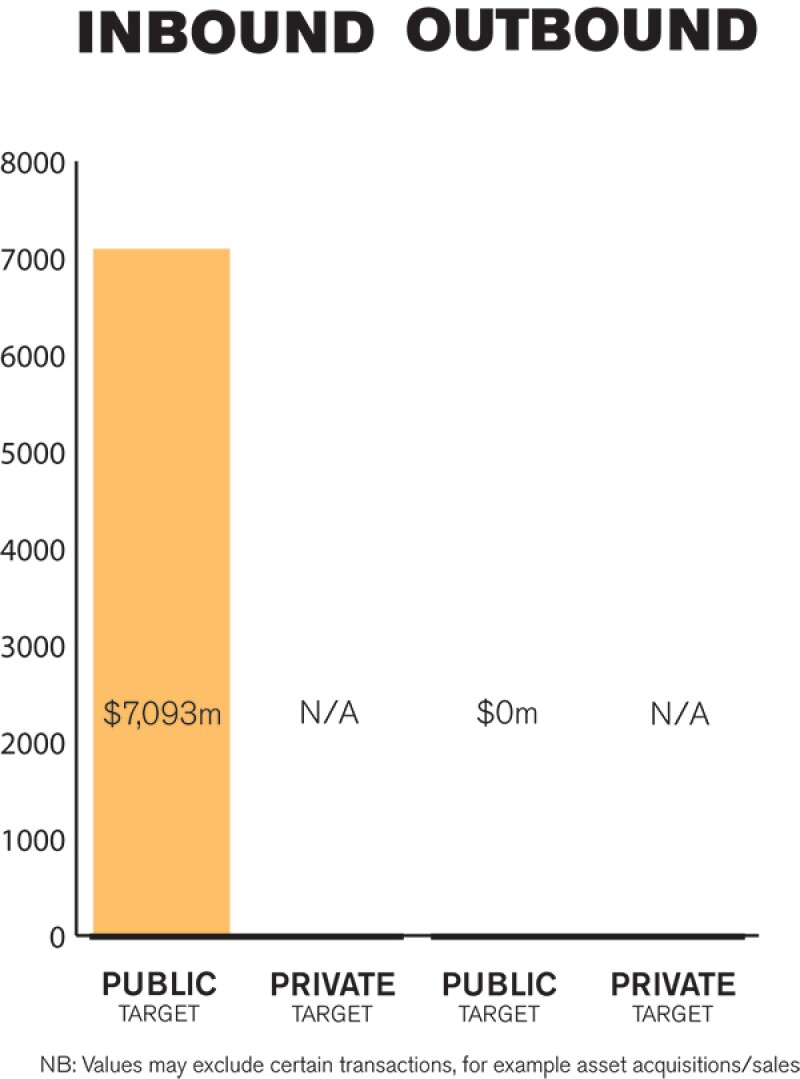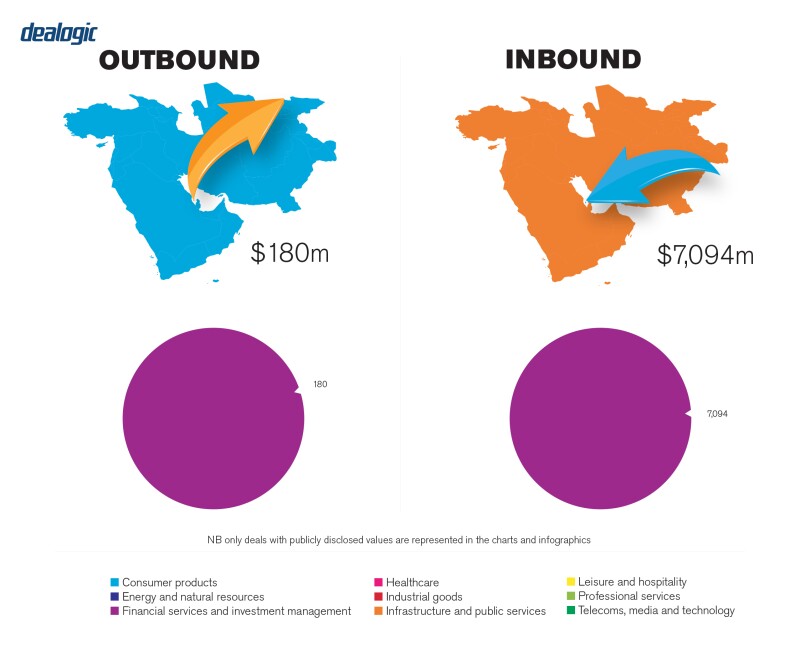The trend of consolidation within the highly fragmented financial industry made significant headway in 2019 with public takeover offers of Bahrain Islamic Bank by the National Bank of Bahrain and Ahli United Bank (AUB) by Kuwait Finance House. The latter was anticipated to close during 2019 but will likely complete in the first half of 2020. In each case, the dynamic of an acquisition involving a conventional financial institution with an Islamic institution influenced the transaction structure, with the former structured as a cash takeover to mitigate Islamic institutions from facing the prospect of owning shares in a conventional bank, and the latter contemplating a post-acquisition restructuring of AUB into an Islamic form.
We note that the healthcare industry is somewhat fragmented, and we are aware of financial difficulties for some hospitals; therefore, some private acquisitions in this field may be on the horizon.
The introduction of VAT seemed to reduce M&A deal flow in 2019 and the major anticipated deal of 2019 (KFH's acquisition of AUB) was delayed. We believe that the deal flow will increase once there is with greater certainty in the VAT space.
As in previous years, the market is driven primarily by private M&A transactions since public M&A activity is still relatively infrequent. This dynamic may be related to the high ownership concentration in most listed companies and scarce liquidity on the Bahrain Bourse. There appears to be some interest in taking some public entities private.
Widening valuation gaps between sell side and buy side are denting liquidity on the domestic M&A market and this negatively impacts deal volumes. VAT has also had an impact. We note that structures involving asset purchases must comply with certain procedures for VAT exemption via a notification process. We are aware that the National Bureau of Revenue may not immediately accept such applications and that it appears to be approaching these matters on a pre-approval, instead of post-enforcement, basis. Share sale transactions therefore would be more appealing as they are entirely outside the scope of VAT.
Private equity investment into Bahrain continues its downward trend. Considerations such as jurisdictional risks in Bahrain and the impact of VAT continue to depress the type of fast growth demands sought by private equity. Also, closely held start-up companies lack a practically enforceable structure for private placements, to the extent that these transactions generally use an offshore vehicle in order to participate in a local entity.
An asset purchase transaction involving Mondelez and Arla Foods reflects a trend in the market for the Bahrain Economic Development Board (EDB) to be actively involved in M&A rather than limiting itself to attracting new business into Bahrain. That case involved coordinating with upwards of eight ministerial bodies to obtain approvals to allow for continuous production through the closing process. We note that Bahrain regulations, and particularly the pre-approval structure of regulatory consents, are not conducive to taking over an operational organisation other than by way of a share sale. The EDB was highly flexible in allowing for the transaction to close successfully. Continued involvement by the EDB is likely to facilitate similarly complex transactions which would otherwise risk becoming trapped in bureaucratic circles.
LEGISLATION AND POLICY CHANGES
The Takeover, Mergers and Acquisitions Module (TMA Regulation) of Volume 6 of the Rulebook (Rulebook 6) issued by the Central Bank of Bahrain (CBB) is the primary governing regulation for public M&A in Bahrain and it works in conjunction with other regulations issued under Rulebook 6. It applies where there is an acquisition or consolidation of control of a Bahrain-domiciled publicly listed company; or an overseas company whose primary listing of equity securities is on a Bahrain exchange. Rulebook 6, including the TMA Regulation, is administered by the Capital Markets Supervision Directorate at the CBB. Private M&A, as such, is not a regulated activity beyond registration of share transfers and transfers of business premises, outlined primarily in Bahrain's Commercial Companies Law.
The Bahrain Personal Data Protection Law (PDPL) was implemented in August 2019 and closely follows the EU's GDPR. Nevertheless, the Personal Data Protection Authority has not yet been formed, with the Bahrain Ministry of Justice taking up the role on a temporary basis. This allows for entities to fulfil notification requirements, but leaves a regulatory gap as the interim body has not yet issued implementing regulations.
Regulations concerning fintech have been issued by the Central Bank of Bahrain; however, these relate primarily to start-ups and we would not anticipate this to impact M&A until 2021 or later.

MARKET NORMS
One common misunderstanding about the Bahrain market leads investors to structure and implement M&A deals following schemes and solutions developed in overseas jurisdictions without paying the necessary attention to the local legal and regulatory framework, in cases of both cross-jurisdictional and purely domestic transactions. This can go unnoticed if no conflict arises between vendor and buyer, although it may result in the completion process conflicting with local regulations. If a conflict arises however, the pitfalls of such an approach become readily intelligible and can result in difficulties in obtaining legal redress in the local jurisdiction, uncertainties surrounding the application of foreign law provisions in domestic court proceedings and an impasse to meeting local requirements for completion.
Post-closing activities are an often overlooked area. Action plans and timelines are often drawn up until the closing date, leaving post-closing activities to proceed without a clear structure, sometimes even managed by a team that did not work on the deal. This neglect often subsists notwithstanding the number and importance of post-closing activities which are often implicated (such as changes to public registers which cannot be completed at closing, etc). Transitional services arrangements involving continued seller involvement are common but may have dubious validity and enforceability.
With the implementation of the PDPL, considerations around data transfer in connection with an asset sale are increasing; however, we have not seen technology relating to the deal-making process. We note that Bahrain does not have a robust IP sector and, while Bahrain is position itself as an ICT centre in the GCC, this has not led to an increased focus on M&A until today.
PUBLIC M&A
Obtaining control of a public company often involves the launch of a public tender offer (whether on a voluntary or a mandatory basis) unless de facto control is achieved by the acquisition of less than 30% of the target company voting share capital. The threshold triggering an obligation to launch a mandatory offer is set at 30% of the voting share capital of the target company and further thresholds are contemplated for certain incremental purchase between 30% and 50% of the voting share capital occurring within a specified timeframe. The launch of a tender offer is accompanied with the publication of an offer document subject to CBB approval.
Usually, conditions attached to an offer include levels of acceptance, approval of shareholders for the issue of new shares and listing/regulatory approvals. A voluntary offer must not be made subject to conditions whose fulfilment depends on the subjective interpretation or judgment by the bidder or lies in the bidder's hands. Once a firm intention to make an offer is formally announced, the bidder is committed to proceed. Scope to withdraw by invoking the conditions to the offer is limited. To the extent that the bidder intends to attach conditions other than normal conditions, the CBB must be previously consulted. As a general rule, with limited exceptions, financing for an offer must be fully committed when the announcement of the firm intention to make an offer is made.
Break-fees are not used in Bahrain and their validity is uncertain as commitments to a break-up fee can be seen as unlawfully impinging upon each shareholder's right to decide whether to sell or retain their shares. In the absence of more legal clarity as to the permissibility of break-up fees, we do not expect that this instrument will be adopted in the structuring of public M&A deals.

PRIVATE M&A
The use of completion accounts is still the prevailing consideration mechanism in the realm of private M&A, though the financial data tracked for the purposes of determining any price adjustment with respect to the headline purchase price varies from working capital only adjustments to fully-fledged adjustments based on net worth variations. Locked-box mechanisms are still relatively uncommon, though we expect to see an increased use of these mechanisms especially in the context of vendor-initiated private auctions. We have seen an increase in the use of earn-outs in private M&A, and believe these are being used as a tool for bridging widening valuation gaps between sellers and buyers. Escrows are very common and are mostly used in connection with management of claims against representations and warranties.
Regulatory approvals are invariably attached to private offers in respect of target companies operating in regulated industries. It is not uncommon to also find MAC clauses associated with specific quantitative metrics, though these are usually bitterly negotiated. It is quite common to bring down all representations and warranties to closing so that any breach (or material breach) may afford the buyer an exit hatch.
Although it is a rather common practice, we strongly advise against the use of foreign coirt jurisdiction clauses in M&A transactions in light of enforceability issues that they create. In case of a foreign governing law, foreign arbitration should be seen as a must due to problems faced in proving the provisions of a foreign law in front of a Bahraini court and difficulties in enforcement in Bahrain of foreign court decisions. Bahrain governing law with Bahrain court enforcement may be valuable to facilitate enforcement of local obligations associated with the transaction and may be favourable for a foreign party who received robust local law advice against a Bahraini counterparty.
We have yet to see W&I insurance in common use in M&A transactions. We also note that CBB regulations require that insured risks existing in Bahrain must be underwritten in Bahrain (albeit with certain special carve-outs and the ability for 100% financial re-insurance). We are not aware of any Bahraini insurers issuing W&I policies.
The exit environment is very challenging. The main exit channel still consists of a private sale to an industrial or private equity purchaser. The IPO exit route is uncommon in light of the structural liquidity issues affecting local capital markets. Sales to financial sponsors are also often unviable because of the reluctance by financial sponsors to take on balance sheet equities also considering the penalizing capital treatment that this asset class receives under the newly implemented capital adequacy regulations.
LOOKING AHEAD
We expect that consolidation in the financial industry will continue, propelled by structural reasons going beyond the existing economic cycle. The level of success in the Bahrain Islamic Bank – National Bank of Bahrain and the impending Kuwait Finance House – Ahli United Bank transactions will be extremely telling of the ability for major consolidation of publicly listed financial institutions. With the implementation of VAT having extended to all businesses, we believe that same will have lessening impact on M&A transactions such that we may see them pick up more in the coming 12 months. We expect market practice to embrace innovative structuring options to face persistent liquidity challenges and believe that Bahrain will position itself as a major player in fintech, while technology in general will enhance the M&A market. We also believe that the PDPL and its similarity to the GDPR will increase the interest of foreign companies already bound by GDPR to extend their presence into Bahrain.
About the author |
||

|
|
Steven Brown Partner, ASAR – Al Ruwayeh & Partners Manama, Bahrain T: +973 17 533 182 Steven Brown is the managing partner of the Bahrain office at ASAR – Al Ruwayeh & Partners (ASAR) and works primarily in the corporate and financial field. He has broad knowledge and experience in corporate law, including governance and compliance of public and regulated entities. He also leads the Bahrain finance practice. He has been involved in numerous banking and finance transactions, local and cross-border acquisitions and transaction structuring in Bahrain. His M&A experience includes acting as lead and local counsel on various transactions representing buyers, sellers and targets in addition to assisting underwriters and financiers on public entity transactions. |
About the author |
||

|
|
Rahul Sud Senior associate, ASAR - Al Ruwayeh & Partners Manama, Bahrain T: +973 17 533 182 Rahul Sud is a senior associate with ASAR and has multi-jurisdictional experience of working in India, Singapore, Qatar and Bahrain. Noted for his skills in developing innovative solutions for clients, he has extensive deal experience across domestic and cross-border mergers and acquisitions, foreign direct investments, joint-ventures, general corporate, restructuring and reorganisations, banking and finance, intellectual property and technology laws. He holds an LLB from Symbiosis Law College (India) and LLM from National University of Singapore. He is a member of the Bar Council of Maharashtra and Goa |


